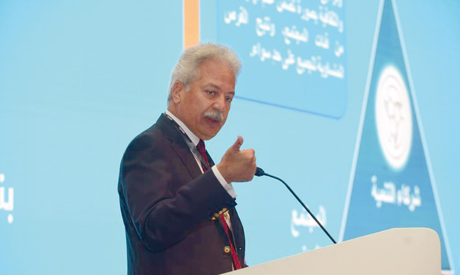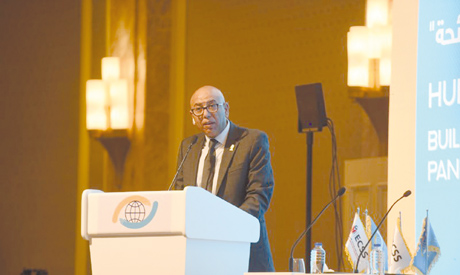“We are not saying the human rights situation in Egypt is rosy, we still have problems, but at least there are signs the political will exists to improve the human rights situation in Egypt,” Essam Shiha, the head of the Egyptian Organisation for Human Rights, said on 8 April during a one-day conference “Human Rights: Building the Post Pandemic World” organised by the Egyptian Centre for Strategic Studies (ECSS) and held in Cairo.
Human rights are fully integrated and do not just cover political rights, Shiha said, responding to a question about the statement issued by 31 countries at the UN Human Rights Council (UNHRC) in March criticising the state of human rights in Egypt.
“We have to realise that some rights, including the right to life, trump others,” he said while highlighting state efforts to combat terrorism.
The issue of pretrial detention was raised during the conference.
“We have to find alternatives to pretrial detention,” Shiha told the conference. The conference recommended that legislative and judicial authorities review the situation and develop mechanisms to avoid lengthy detention without trial.
Tarek Radwan, chair of the Human Rights Committee in the House of Representatives, stressed that attempts to assess the human rights situation in Egypt necessitated recourse to established communication channels.
“If [foreign states and organisations] want to listen to the opinions [of untrustworthy sources] they should also listen to the legislative authority entrusted with overseeing the executive authority,” Radwan said.
Alaa Roshdi, assistant to the foreign minister, told the conference that “launching Egypt’s Supreme Standing Committee for Human Rights reflects a paradigm shift in Egypt’s vision on how to deal with the human rights’ file.”

Shiha
To help with communication, the ECSS has invited regional offices of international organisations in Egypt to contribute to a more dynamic framework for communication, cooperation and joint work in the field of human rights.
The idea behind the conference, which will be an annual event, according to the head of the ECSS Khaled Okasha, was to envision the post-Covid world through the prism of the International Agenda on Human Rights, issued by the UN last December, which identified ending discrimination and racism, addressing inequality, promoting participation and solidarity, and supporting sustainable development as fundamental rights.
Five ministers attended the conference and briefed participants about state efforts to alleviate the impact of the pandemic.
During a session discussing “Challenges to Equality and Promoting Sustainable Development,” Education Minister Tarek Shawki said the most vital foundation for development was “equal access to quality education”.
“Had it not been for the state’s investment in infrastructure and content before the pandemic we would not have been able to provide access to education for all during the course of the pandemic,” Shawki said.
The state’s achievements in developing education prior to the pandemic helped it overcome the challenges posed by Covid-19. The state, stressed Shawki, had already invested in the infrastructure needed to allow every student in Egypt access to the Internet.
The education minister noted that “international organisations classified education in Egypt among the three best experiences in the world during the coronavirus pandemic” and added that the ministry conducted 50 million electronic exams for students at a time when many countries simply suspended education.
The Minister of Social Solidarity Nevine Al-Kabbaj said that to confront the challenges posed by the pandemic the ministry had pushed forward with digitisation and by December 2021 all its services will be automated.
The pandemic, according to Al-Kabbaj, had been a learning experience.
“It taught us about mechanisation and to break down the barriers between us, to work online and judge our work on the basis of results. It helped us think about irregular employment and the importance of social and insurance protection, and to pay greater attention to risk analysis.”
Minister of Health Hala Zayed highlighted the state’s efforts in the health sector before the pandemic and how they helped alleviate its severity. She pointed to the 100 Million Health initiative and reductions in the waiting time for treatment. The 100 Million Health initiative included mass screenings for all citizens over the age of 18 for Hepatitis C, and non-communicable diseases including diabetes, hypertension, and obesity. Sixty million Egyptians received check-ups and were treated between October 2018 and April 2019.
“Reducing waiting lists for treatment allowed us to perform 11,000 surgical interventions for free,” said Zayed.
The minister of health said the state was keen to integrate immigrants into ongoing health projects and initiatives.
Laurent De Boeck, head of the International Organisation for Migration (IOM) in Egypt, thanked Zayed for highlighting the importance of integrating immigrants into health projects, stressing that “no one will be safe until everyone is safe.”

Okasha
“That six million immigrants live in Egypt shows that the country welcomes people from brotherly states just as it has been welcoming people for centuries,” De Boeck said.
Though a large number of immigrants live in Egypt, such is their integration in the community they are more or less invisible, said De Boeck.
The closing statement of the conference noted that the pandemic had exposed deeply-rooted imbalances in human rights, and that the world will enter the period of recovery poorer and more exhausted, and with a set of global arrangements, in place since World War II, that appear less fit for that purpose than ever.
Among its recommendations, the conference urged the role of the World Health Organisation to be expanded to allow it to earlier detect crises and encourage countries to cooperate and share information more quickly, and stressed that the universal right to health required fair access to vaccines and other treatments.
The need for more flexible, inclusive and dynamic educational systems to avoid disruption in times of crisis was also highlighted in the recommendations of the conference.
*A version of this article appears in print in the 15 April, 2021 edition of Al-Ahram Weekly
Short link: